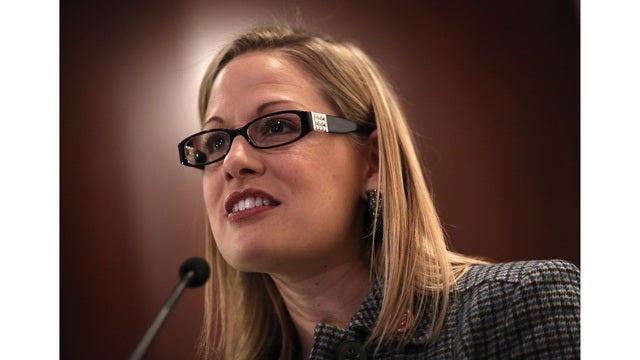Sinema leaving the Democratic Party and registering as an independent
(CNN) — Arizona Sen. Kyrsten Sinema is leaving the Democratic Party and registering as a political independent, she told CNN’s Jake Tapper in an exclusive TV interview.
“I’ve registered as an Arizona independent. I know some people might be a little bit surprised by this, but actually, I think it makes a lot of sense,” Sinema said in a Thursday interview with Tapper in her Senate office.
“I’ve never fit neatly into any party box. I’ve never really tried. I don’t want to,” she added. “Removing myself from the partisan structure — not only is it true to who I am and how I operate, I also think it’ll provide a place of belonging for many folks across the state and the country, who also are tired of the partisanship.”
Sinema’s move away from the Democratic Party is unlikely to change the power balance in the next Senate. Democrats will have a narrow 51-49 majority that includes two independents who caucus with them: Sens. Bernie Sanders of Vermont and Angus King of Maine.
While Sanders and King formally caucus with Democrats, Sinema declined to explicitly say that she would do the same. She did note, however, that she expects to keep her committee assignments — a signal that she doesn’t plan to upend the Senate composition, since Senate Majority Leader Chuck Schumer controls committee rosters for Democrats.
“When I come to work each day, it’ll be the same,” Sinema said. “I’m going to still come to work and hopefully serve on the same committees I’ve been serving on and continue to work well with my colleagues at both political parties.”
But Sinema’s decision to become a political independent makes official what’s long been an independent streak for the Arizona senator, who began her political career as a member of the Green Party before being elected as a Democrat to the US House in 2012 and US Senate in 2018. Sinema has prided herself on being a thorn in the side of Democratic leaders, and her new nonpartisan affiliation will further free her to embrace an against-the-grain status in the Senate, though it raises new questions about how she — and Senate Democrats — will approach her reelection in 2024 with liberals already mulling a challenge.
Sinema wrote an op-ed in the Arizona Republic released Friday explaining her decision, noting that her approach in the Senate has “upset partisans in both parties.”
“When politicians are more focused on denying the opposition party a victory than they are on improving Americans’ lives, the people who lose are everyday Americans,” Sinema wrote.
“That’s why I have joined the growing numbers of Arizonans who reject party politics by declaring my independence from the broken partisan system in Washington.”
Sinema is up for reelection in 2024 and liberals in Arizona are already floating potential challengers, including Arizona Rep. Ruben Gallego, who said earlier this year that some Democratic senators have urged him to run against Sinema.
Sinema declined to address questions about her reelection bid in the interview with Tapper, saying that simply isn’t her focus right now.
She also brushed aside criticism she may face for the decision to leave the Democratic Party.
“I’m just not worried about folks who may not like this approach,” Sinema said. “What I am worried about is continuing to do what’s right for my state. And there are folks who certainly don’t like my approach, we hear about it a lot. But the proof is in the pudding.”
Sinema and West Virginia Democratic Sen. Joe Manchin have infuriated liberals at various points over the past two years, standing in the way of President Joe Biden’s agenda at a time when Democrats controlled the House, Senate and White House.
Sinema and Manchin used their sway in the current 50-50 Senate — where any single Democrat could derail a bill — to influence a host of legislation, especially the massive $3.5 trillion Build Back Better bill that Biden proposed last year. Sinema’s objections to increasing the corporate tax rate during the initial round of negotiations over the legislation last year particularly rankled liberals.
While Sinema was blindsided by the surprise deal that Manchin cut with Senate Majority Leader Chuck Schumer in July on major health care and energy legislation, she ultimately backed the smaller spending package that Biden signed into law before the election.
Both Manchin and Sinema also opposed changes to the Senate’s filibuster rules despite pressure from their Senate colleagues and Biden to change them. After a vote against filibuster changes in January, the Arizona Democratic Party’s executive board censured Sinema.
Sinema has been in the middle of several significant bipartisan bills that were passed since Biden took office. She pointed to that record as evidence that her approach has been an effective one.
“I’ve been honored to lead historic efforts, from infrastructure, to gun violence prevention, to protecting religious liberty and helping LGBT families feel secure, to the CHIPs and science bill to the work we’ve done on veterans’ issues,” she told CNN. “The list is really long. And so I think that the results speak for themselves. It’s OK if some people aren’t comfortable with that approach.”
Sinema’s announcement comes just days after Democratic Sen. Raphael Warnock won reelection in Georgia, securing Democrats a 51st Senate seat that frees them from reliance on Vice President Kamala Harris’ tiebreaking vote.
Sinema declined to address questions about whether she would support Biden for president in 2024, and she also said she’s not thinking about whether a strong third party should emerge in the US.



